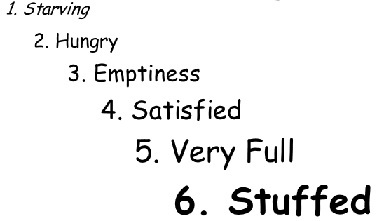Ever feel so hungry that your lack of food causes you to become angry? It's a state that's defined as "hangry." Ever feel "hangry" when food service is slow in a restaurant? Hunger and feeling hungry seem to draw negative connotations. My online clients tell me that hunger reminds them of images of the Great Famine in Ireland, of being deprived, of not having enough food as children. Or indeed of Bono advocating an end to world hunger.
Given that hunger is associated with panic, emergency and famine, it's hardly surprising that we often avoid it. When last did feel hungry before you reached for food? Or listened for that gurgling or growling sound before you ate? We only need to eat for stomach hunger, but often we eat by the clock, when someone offers us food, or simply because food is available. When you eat for these reasons you're listening to external cues that have little or nothing to do with stomach hunger, rather than internal signals of hunger and satiety. Here are some familiar examples:
- For some online clients, constant sacking and grazing between meals means they avoid feeling empty or hungry. We're caught in all-day food cues. Food manufacturers have ensured that it is now easier than ever to never feel hungry, with snacks such as yoghurt drinks and packaged sandwiches to be eaten on the go.
- Year of overeating and dieting can also put you out of touch with hunger. Eating for anxiety and stress or emotional eating can result in a whopping 80 percent of our eating. Emma, a 36-year-old mother, noticed that she was confusing feelings of anxiety in her stomach with hunger. She also associated the emptiness in her stomach with loneliness and so ate to avoid the emptiness and hunger.
- Many parents feed their children with a deliberate focus on quantity, so they are "well-fed" and don't feel hungry. Perhaps they're transferring their own anxieties about hunger. Don't rush to feed your kids even if they say they are hungry. I remind my 8-year-old daughter, "It's okay to be hungry; your dinner will be ready in an hour, so you can wait."
Scale it Back
One of our goals in the Heyday program is to make deliberate and mindful choices around eating, as opposed to being mindless and feeling out-of-control around food. It's good to allow yourself to become familiar with feeling hungry. Just don't wait until you're starving or feel ravenous, or you might end up eating all around you. Online participants often ask, "How much is enough?" This hunger scale gives a good indication.

Enough means satisfied or almost full. It's different from being full. Nor does it mean feeling uncomfortably full or stuffed to the gills. Eating just enough means leaving some room in your stomach. It means being aware of your stomach and eating, and this is easier to do when you eat slowly. If you're struggling with weight, then getting in touch with hunger is a crucial. So the next time you eat, can you wait until you are feeling a little hungry? Can you get comfortable with the discomfort of feeling hungry? The Great Famine is over, and I often reassure clients, "There will always be enough food and you can eat again the next time you're hungry". We live in a part of world where food is in plentiful supply. So be selective, be picky -- exactly what you were warned not to be as a child!
Have a Heyday
Send your comments or questions to Bernadette at hello@heydayworld.com. See www.facebook.com/heydayworld for tips and advice.
Wishing you good health,
Dr. Bernadette Rock (PhD).